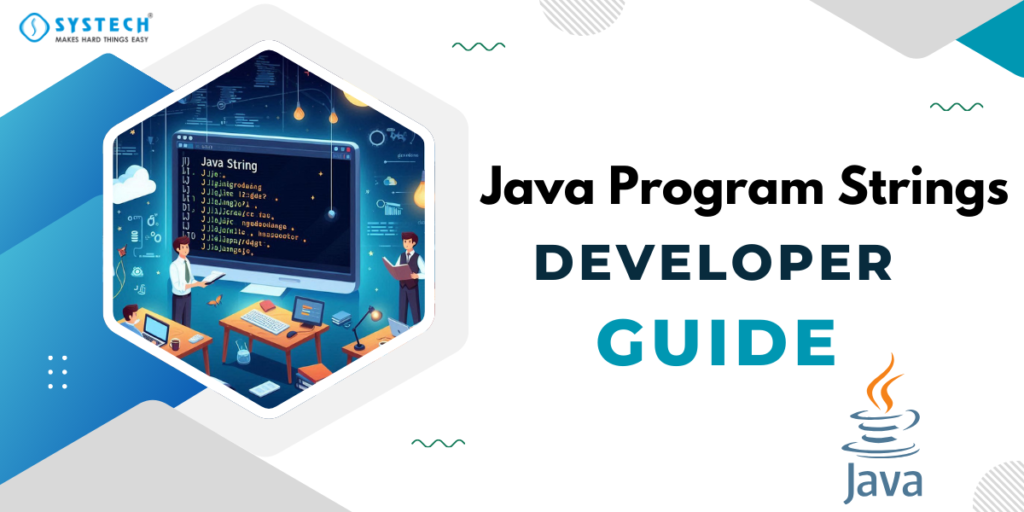The foundation of text processing in Java programming are Java strings. They are powerful objects with an abundance of methods and features, not simply a basic data type. Writing effective and potent programs requires an in-depth comprehension of Java strings, regardless of experience level of coders.
Table of Contents
Overview of Java Programming Strings
Character sequences are represented as Java strings, which are objects. They are widely used in Java programming, where they can be applied to everything from data manipulation to user input. What, though, makes them so unique?
Important Points:
- Java strings are not primitive types; they are objects.
- They are unchangeable once generated, which is known as immutability.
- There are many different ways for manipulating strings available in the String class
Java String Fundamentals
In Java, creating strings is simple, but there are other approaches to choose. Let’s examine the various approaches:
Literals in strings:
String name = "John Doe";
Using the new keyword:
String name = new String("John Doe");
Using constructors for strings:
String name = new String(char[] charArray);
Java String Pool:
Java stores string literals in a dedicated memory region known as the string pool. Both performance and memory savings are aided by this enhancement.
Method of Creation | Stored in String Pool? |
String literal | Yes |
new keyword | No |
intern() method | Yes |
Techniques and Operations with Strings
Java has a wide range of string manipulation functions. Now let’s examine a few of the most often utilized ones:
Joining
String joining is a basic operation. Java provides several methods for joining strings together:
Using the + operator:
String fullName = firstName + " " + lastName;
Using the concat() method:
String fullName = firstName.concat(" ").concat(lastName);
Using StringBuilder:
StringBuilder sb = new StringBuilder(); sb.append(firstName).append(" ").append(lastName);
Substring Extractions
With the substring() function, you can extract a specific segment of a string:
String text = "Hello, World!";
String sub = text.substring(0, 5); // Returns "Hello"
Comparing Strings
In Java programming, comparing strings is a typical activity. These are the main techniques:
- equals(): This function compares strings’ contents.
- equalsIgnoreCase(): Disregards case when comparing strings
- compareTo(): Performs lexicographic string comparisons
Examining: String Contrast Think about the following situation:
String str1 = "Hello";
String str2 = "hello";
String str3 = new String("Hello");
System.out.println(str1.equals(str2)); // false
System.out.println(str1.equalsIgnoreCase(str2)); // true
System.out.println(str1 == str3); // false
System.out.println(str1.equals(str3)); // true
The significance of utilizing the appropriate comparison method for strings in Java is demonstrated by this case study.
Complex String Management
You’ll run into increasingly intricate string operations as you learn more about Java programming. Let’s investigate a few sophisticated methods:
Regular Expressions
Regular expressions and Java’s String class work well together to provide strong pattern matching and text processing:
String text = "The lazy dog is jumped over by the swift brown fox";
String pattern = "\\b\\w{5}\\b";
Pattern r = Pattern.compile(pattern);
Matcher m = r.matcher(text);
while (m.find()) {
System.out.println("Found: " + m.group());
}
In the provided text, this code locates every word with five letters.
StringBuilder and StringBuffer
The immutable String can be replaced by changeable equivalents like StringBuilder and StringBuffer classes in scenarios where you regularly need to edit strings:
StringBuilder sb = new StringBuilder("Hello");
sb.append(" World");
sb.insert(5, ",");
System.out.println(sb.toString()); // Outputs: Hello, World
The primary distinction between StringBuilder and StringBuffer is that the former is thread-safe and synchronized, while the latter is not.
Typical String-Related Difficulties
Developers work with strings on a regular basis. Let’s examine a few such problems and their fixes:
String reversal:
StringBuilder sb = new StringBuilder("Hello");
sb.append(" World");
sb.insert(5, ",");
System.out.println(sb.toString()); // Outputs: Hello, World
Looking for palindromes:
public static boolean isPalindrome(String str) {
String clean = str.replaceAll("\\s+", "").toLowerCase();
return clean.equals(new StringBuilder(clean).reverse().toString());
}
Character occurrences counted:
public static Map<Character, Integer> countChars(String str) {
Map<Character, Integer> charCount = new HashMap<>();
for (char c : str.toCharArray()) {
charCount.put(c, charCount.getOrDefault(c, 0) + 1);
}
return charCount;
}
Practical Uses for Java Strings
Java strings are essential to many practical applications. Here are a few instances:
- Validation of user input: Strings are frequently used to verify user input, including phone numbers and email addresses.
- Data parsing: Strings are necessary for parsing and modifying data when working with file I/O or network connections.
- Text processing: Word processors and code editors, for example, mostly use string operations.
- Interactions with databases: SQL queries are built using strings, and results are processed using strings.
Java Program String Usage Best Practices
Take into account these best practices to get the most out of Java strings:
- To utilize the string pool, use string literals for constants.
- For looping over several strings, use StringBuilder.
- For case-insensitive string comparisons, use equalsIgnoreCase().
- Recall that every operation on a string creates a new instance of the string; strings are immutable.
Java Strings vs Other Programming Languages
Java handles strings differently than other languages. Here’s a brief comparison:
Language | String Mutability | String Pool | Primary String Class |
Java | Immutable | Yes | String |
C++ | Mutable | No | std::string |
Python | Immutable | Yes | str |
JavaScript | Immutable | No | String |
Java's Future for String Handling
String handling is continuously being improved by the Java community. Among the possible upgrades in the future are:
- More effective joining of strings
- Enhanced compatibility with Unicode
- Improved features for string interpolation
Final Thoughts
For any Java developer, mastering Java program strings is crucial. Many Java applications rely on strings, from simple operations to complex strategies. You can write code that is more reliable and efficient by comprehending how they behave and applying appropriate techniques.

